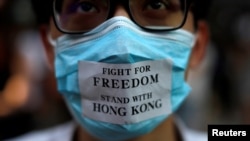HONG KONG - VOA Mandarin Service reporters Libo Liu and Daphne Fan
The Hong Kong government on Friday banned people from wearing masks at public protests by invoking a British colonial era emergency powers act.
Carrie Lam, Hong Kong’s Chief Executive, claimed authority under the Emergency Regulations Ordinance that was last used to quell riots in 1967. The new regulation to take effect on Saturday, Lam said, is a “prohibition of the face covering” and is intended to “target rioters or those that resort to violence.”
The law also has exemptions for those who have legitimate needs to wear a mask.
“It is essential for us to stop violence and restore calmness in society as soon as possible,” said Lam in announcing the measure during a news conference in the Legislative Council.
It was not clear how the government would implement the mask ban in a city of 7.4 million residents and where many wear masks to protect against pollution or infection, such as the outbreak of the deadly Severe Acute Respiratory Syndrome (SARS) that struck the city in 2003.
Law and order
The controversial anti-mask law is strongly supported by pro-Beijing elements in the legislature that view the increasingly violent democracy protests as a threat to law and order, while opponents see the measure as a way to deter peaceful dissent.
For the last four months the city has been engulfed in unrest as democracy advocates engaged in increasingly confrontational tactics to fight against what they see as China’s efforts to restrict Hong Kong’s autonomy and civil liberties.
Hong Kong government supporters defend the restrictive emergency measure as need to protect public safety.
“What we are talking about is pinpointing a riot, an illegal assembly. So what we think that is the law will not affect the daily lives of people, and will not affect the freedom of speech and freedom of demonstration by Hong Kong citizens,” said Elizabeth Quat, a Hong Kong legislator with the Democratic Alliance for the Betterment and Progress of Hong Kong political party that is widely seen as aligned with the leadership in Beijing.
Police guideline
Hong Kong police also recently loosened guidelines on their use of force, giving them greater power to deal with protesters in difficult situations, according to police documents seen by Reuters.
This week, for the first time, a police officer shot an 18 year old student using live ammunition, during a massive protest on China’s Communist Party anniversary.
During the mass demonstrations on Tuesday, police officers deployed a record level of force and firearms, including firing about 1,400 rounds of tear gas, 900 rubber bullets and six live rounds.
Intimidation tactics
In central Hong Kong on Friday thousands of pro-democracy demonstrators responded in defiance of the new law by wearing masks during a lunchtime rally.
Some protesters have clashed with police, used gasoline bombs to block subway stations and vandalized China-associated businesses. Police, in turn, have used water cannons, tear gas and rubber bullets against the demonstrators.
More than 100 people were injured during Tuesday's mass demonstrations in Hong Kong during which police fired water cannons and tear gas to disperse crowds. Some protesters armed with rocks and homemade gasoline bombs also attacked police.
Anti-mask law opponents say the measure will not deter radical elements in the democracy movement that can and should be prosecuted for breaking existing laws when they attack police or destroy property.
Instead they say, the anti-mask law is meant to expose peaceful protesters to intimidation and repercussions from China affiliated employers.
“People like working in the Chinese state enterprise company in Hong Kong may want to protest peacefully. But they have a good reason that they don't want to be retaliated or single out by the Chinese investor behind the company,” James To, a Hong Kong legislator with the opposition Democratic Party.
In August, Cathay Pacific Airways, reportedly under pressure from China, suspended and subsequently fired 20 pilots and cabin crew staff for participating in the protest movement, according to the Hong Kong Confederation of Trade Unions.
Lam said if the unrest continues the Hong Kong government would considering further emergency measures. It has been reported that imposing a curfew that could negatively impact tourism and local businesses has also been discussed by authorities.
Hong Kong legislators who have not been allowed to vote on the measure say this use of emergency powers erodes Hong Kong’s democracy.
“This is a further draconian step, an attempt to restrict the freedoms and rights of the Hong Kong people, to damage to the rule of law, and there'll be no legislative scrutiny at home. So I think that this is a dangerous step,” said Dennis Kwok, Hong Kong Legislative Council member with the Civic Party.




